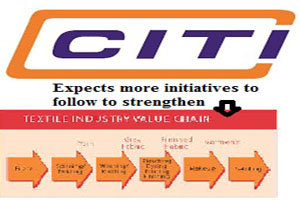
CITI expects more initiatives to follow to strengthen textile value chain
YarnsandFibers News Bureau 2016-06-24 11:00:00 – AhmedabadConfederation of Indian Textile Industry (CITI) has welcomed the initiative for job creation in garment industry and hopes more initiatives are expected to follow to strengthen and support the textile value chain and the make in India initiative.
CITI said in its statement that China and India have robust textile value chain, which has been the core strength and source of confidence for international buying houses. It is also a fact that Bangladesh is heavily investing to strengthen the textile value chain to provide comfort to the buying houses and maintain their growth for garment exports. On the back of TPP discussions, Vietnam is investing in substantial capacities for yarn and fabric manufacturing to bolster their value chain to support and enhance their garment exports.
However, CITI said that the package announced by the government should integrate the apparel export benefit to further strengthen the textile value chain. While they appreciate that government is considering compensation for the State taxes suffered by the garment exporters, it is important to appreciate the highest embedded State taxes are at the fabric stage due to complex and involved manufacturing process.
Garment exporters have been given special dispensation for duty-free import of fabric and still allowing drawback benefit on the residual value after deducting the import of fabric.
In the interest of maintaining and strengthening the textile value chain, and make-in-India initiative, it is recommended that the garment exporters be encouraged to source cotton fabric and other fabrics that are manufactured in India.
The textile manufacturer would be able to avail the benefits under deemed export scheme, which would make them eligible for benefits of duty-drawback scheme. It would indeed be a win-win situation for apparel and textile manufacturers, working together, contributing to employment and retaining value addition within the country.
CITI has suggested some benefits such as over-time, fixed time employment scheme be extended to the full textile value chain. If the scheme can be modified to strengthen the value chain, to eliminate taxes and support productivity improvement, the ultimate outcome would be far superior than expected.
CITI further acknowledging vertical integration of textile value chain is India's strength has urged the government to link the scheme to other segments of the textile value chain.
According to a recent study by the World Bank on Apparel employment, trade and economic development in South Asia, recognizes the fact that the international buyers value full package vertical capability and thus the entire value chain. This would mean that the international buyers prefer to work with suppliers that provide full package, that is fabric manufacturing, supply chain related services in addition to assembly activities.
Market Intelligence
Ask for free sample Report

experience
Customer Base
dedicated team
Countries Served Worldwide









